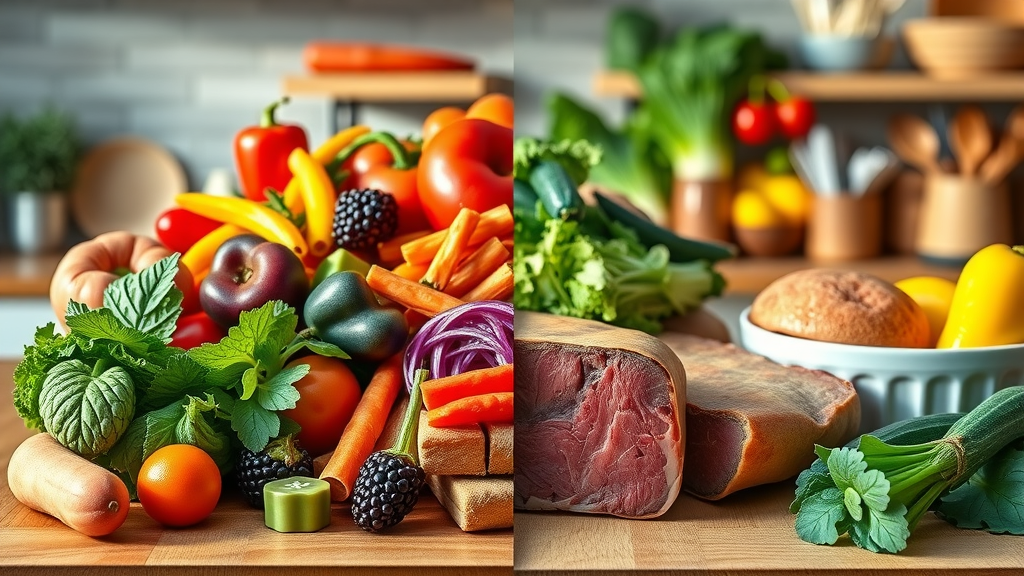Did you know? A striking meta-analysis shows that people who adopt a plant-based diet can reduce their risk of chronic disease by as much as 52% . Yet, despite such compelling data, most of us remain unaware of plant-based healing’s vast potential for our individual well-being and collective public health. As the demand for rapid recovery methods and sustainable health strategies rises, understanding the disruptive effect of plant-based healing on established medical wisdom has never been more urgent.
Why Plant-Based Healing Holds the Key to Transforming Public Health
- A recent meta-analysis reveals that adopting a plant-based diet can reduce the risk of chronic disease by up to 52%.
Public health experts are beginning to acknowledge what leading-edge nutritionists have long understood: plant-based healing is a cornerstone of preventive care. Ample research shows that introducing more fruits, vegetables, legumes, and whole grains correlates with dramatic decreases in common risk factors for cardiovascular disease, obesity, and hypertension . Not only does a healthy plant-centered approach help to lower risk, but it can also accelerate recovery after illness, injury, or surgery. While some critics label plant-based interventions as a passing trend, mounting real-world evidence and randomized controlled trials establish them as a critical force in the battle against chronic disease and soaring healthcare costs.
Pioneering policymakers see this movement as a gateway to lowering physical, emotional, and financial burdens on society. By shifting our “national diet” away from red meat and processed foods , we access a largely untapped reserve for enhancing health, improving outcomes, and creating a cultural reset around food and wellness. In a world plagued by preventable ailments, plant-based healing is no longer just personal—it’s a public health imperative.

Essential Principles of Plant-Based Healing for Public Health
The science of plant-based healing encompasses much more than swapping burgers for broccoli. True healing requires a deliberate distinction between following fleeting “healthy plant” trends and embracing core principles that address root causes of chronic disease. To meaningfully impact public health, dietary patterns must emphasize whole, unprocessed foods and minimize risks associated with processed food and excessive red meat consumption.
Delineating Plant-Based Healing From Popular Healthy Plant Trends
- The difference between whole-food and processed foods in plant-based diets cannot be overstated. While both might carry the “plant-based” label, only whole-food options—such as fresh vegetables, unprocessed grains, and legumes—prove consistently beneficial for weight loss and heart health.
- The impact of red meat reduction on public health outcomes is well documented, with lower consumption linked to improved blood pressure, reduced cardiovascular risk, and longer life expectancy. Together, these factors make adopting primarily whole-food, plant-based patterns a cornerstone of effective, sustainable healing.
Confusion arises when the lines blur between genuinely heart-healthy choices and the processed plant-based alternatives saturating the shelves. While a vegan diet can dramatically lower risk factors, it only delivers on its promise when built around whole foods with minimal additives. In practice, this means most of the calories should come from foods closest to their natural state—not highly processed, sugary, or salt-laden alternatives. Focusing on fruit and vegetables , legumes, whole grains, nuts, and seeds—as opposed to plant-based junk food—translates to tangible improvements in public health indicators.

How Plant-Based Healing Powers Rapid Recovery: The Science
What’s the biological pathway that enables plant-based healing to deliver rapid recovery? It’s rooted in both cellular repair and macro-level shifts in inflammation, blood pressure, and metabolic health. Research demonstrates that whole-food vegan diets—especially those emphasizing healthy plant sources—support the body’s natural healing abilities by flooding it with antioxidants, micronutrients, and fiber while minimizing inflammatory triggers common in processed food and red meat.
Real-World Evidence: Weight Loss and Reduced Health Risks
- Clinical research on vegan diet and recovery rates has revealed that patients adhering to a vegan or whole-food, plant-based protocol recover more swiftly after surgery, illness, or injury than those who maintain a traditional omnivorous or heavily processed dietary pattern.
- Reducing processed food means that markers of inflammation—such as C-reactive protein and interleukin-6—decline, paving the way for more stable energy, faster wound healing, and overall better outcomes in public health settings.
In large-scale randomised controlled trials, participants switching to a healthier plant-centered diet not only report weight loss and lower body weight but also see improvements in blood pressure, lipid profiles, and key cardiovascular disease risks. This science is translating into public health campaigns worldwide, aiming to curtail the rising tide of chronic disease and make rapid recovery the new normal for all populations.

The Truth About Processed Food and Red Meat in Public Health Context
No conversation about plant-based healing is complete without addressing the controversial role of processed food and red meat in shaping health outcomes. Decades of epidemiological studies link the high consumption of red and processed meats—sausages, bacon, deli cuts—as potent risk factors for cancer, diabetes, and cardiovascular disease. In contrast, switching to healthy plant options, such as whole grains and legumes, is associated with a lower risk of these chronic diseases and better weight management across age groups.
Processed Foods vs. Healthy Plant Options: A Table Comparison
| Category | Calories (per 100g) | Key Nutrients | Health Risks | Implications for Recovery |
|---|---|---|---|---|
| Processed Foods | 250-500 | Refined starch, sugar, sodium | + obesity + high blood pressure + delayed healing |
Poor nutrient density, increased inflammation |
| Red Meat | 250-350 | Protein, saturated fat, iron | + cancer risk + cardiovascular disease + increased inflammation |
Elevated risk factor, hinders rapid recovery |
| Whole Plant-Based Foods | 50-120 | Fiber, antioxidants, vitamins, phytonutrients | - lower risk chronic diseases - healthy body weight - supports healing |
Promotes rapid recovery, optimal nutrient support |
- Highlight critical nutrients, calorie counts, and recovery implications: Processed foods and red meats are energy-dense, high in saturated fats, salt, and sugar. In contrast, nutrient-rich plant-based foods provide the building blocks for healing, sustainable weight loss, and lower cardiovascular risk.

Debunking Myths: Is a Vegan Diet Truly Ideal for Plant-Based Healing?
- Common misconceptions spread via social media often exaggerate the ease or challenges of transitioning to plant-based healing. Viral news sometimes ignores the nuances of nutritional adequacy and the risks of highly processed plant-based alternates.
- Addressing nutritional adequacy, studies find that a carefully planned vegan diet can meet all macronutrient and micronutrient needs for most people—provided attention is given to vitamin B12, iron, omega-3s, and protein sources.
Despite rumors, the vegan diet is neither a nutritional panacea nor a dangerous fad; it’s a solution rooted in evidence-based science, best applied with mindful adherence and appropriate supplementation where needed. Lifestyle adherence is most successful when anchored in a whole-food approach, supported by robust resources and social networks, as opposed to emulating the glossy, sometimes misleading portrayals circulating on social media.
How Social Media Drives Public Health Trends in Plant-Based Healing
- Viral stories on plant-based recovery continue to shape public opinion and influence national dietary patterns. Recent plant based news cycles highlight stunning before-and-after transformations, motivating individuals to adopt healthy plant habits even if only partially.
People underestimate the healing power of food until they experience it themselves.

Personal Reflections: My Own Journey With Plant-Based Healing
- Initial skepticism about weight loss and rapid recovery claims led me to approach these dietary patterns with caution, choosing instead to rely on familiar processed foods and occasional red meat meals.
- Firsthand experiences shifted my perspective: Cravings for processed food slowly gave way to a fascination with delicious healthy plant alternatives, from vibrant salads to hearty bean stews and inventive vegan treats.
- The impact was unexpected: Within weeks, my energy, clarity, and mood soared, and my understanding of public health’s role in shaping personal choices deepened. Over time, every meal became a subtle act of self-care aligned with a greater vision for national wellness.
Every meal became an act of self-care – and a vote for better health.

Practical Guide: Starting Your Own Plant-Based Healing Journey
- Identify processed foods and swap them for whole, healthy plant ingredients: Survey your pantry and fridge for heavily processed items, replacing them with fruits, vegetables, grains, and legumes. The less packaging, the better.
- Integrate high-nutrient vegan diet staples: Make lentils, chickpeas, tofu, leafy greens, and seeds the foundation of your meals, ensuring a spectrum of nutrients while supporting rapid recovery.
- Reduce reliance on red meat gradually: Rather than abrupt elimination, phase down red and processed meat consumption—swap steak nights with “Meatless Mondays” and explore global plant-based cuisines for inspiration.
- Leverage social media for recipes and motivation: Follow credible nutrition influencers, join plant-based support communities, and keep your news feed filled with creative, healthy ideas. Social connections make healthy habits stick.

Evidence at a Glance: Key Takeaways on Plant-Based Healing and Public Health
- Rapid recovery rates are consistently documented in plant-based interventions. Patients and populations see sharper improvements in body weight, inflammation markers, and health outcomes, reinforcing plant-based healing’s value as a front-line public health strategy.
- Plant-based diets directly improve public health markers across diverse demographics, from children to seniors—lowering risks for heart disease, diabetes, and cancer to drive broader societal change.
Common Questions Around Plant-Based Healing
How quickly can you see results from plant-based healing?
- Most participants in scientific studies report increased energy, better digestion, and reduced symptoms of chronic ailments within two to four weeks of transitioning to a whole-food, plant-based diet. Some see weight loss as early as the first month.
Does plant-based healing help with weight loss?
- Yes, adopting a healthy plant-based or vegan diet is proven to reduce calorie intake and support significant, sustainable weight loss. Lower body weight and improved metabolic markers follow as high-fiber, nutrient-dense foods replace calorie-dense, processed alternatives.
Are processed foods in plant-based diets harmful?
- Highly processed plant-based foods—such as faux meats and sugary snacks—can undermine the health benefits of a plant-based approach. For optimal plant-based healing, focus on whole, natural foods prepared simply and minimally.
Is removing red meat necessary in plant-based healing?
- Strong evidence indicates that minimizing or excluding red and processed meat is a foundational pillar of effective plant-based healing for public health. Individuals who make this shift generally experience enhanced recovery, lower cardiovascular and cancer risks, and overall better health.
Expert Insights: Leading Public Health Voices on Plant-Based Healing
"Transitioning society to healthy plant-based diets could save millions of lives and billions in healthcare costs." – Leading Nutritionist

Critical Considerations: Navigating Social Media, Trends, and Misinformation
- Evaluate claims about plant-based healing rigorously: With social media playing an outsized role in shaping public health opinion, it’s crucial to separate evidence-backed news from clickbait and viral anecdotes.
- The rising role of influencers in molding social norms around healthy plant eating can either drive positive changes or contribute to misunderstanding—so follow professionals with substantiated advice and credentials.
Real-Life Transformations From Plant-Based Healing
- Nothing drives home the power of plant-based healing like real stories. From individuals battling obesity who shed excess body weight to cancer survivors rebuilding vigor, rapid recovery and lasting well-being are attainable for people of all backgrounds.
- These stories—amplified through plant based news reports and social media—demonstrate that choosing a dietary pattern rich in whole plants and low in processed food and red meat creates a ripple effect across body, mind, and community.

FAQs on Plant-Based Healing and Public Health
-
Can children and seniors benefit equally from plant-based healing?
Yes. With careful planning to meet nutritional needs, whole-food, plant-based diets support healthy growth in children and preserve energy, joint health, and cognitive function in seniors. -
Are there risks to a vegan diet if not properly planned?
Potential risks include deficiencies in vitamin B12, iron, and omega-3s, but with education and supplementation, a vegan diet can be entirely safe and highly beneficial for all ages. -
How can plant-based healing affect chronic diseases?
Well-researched evidence demonstrates that plant-based diets reduce the risk and, in some cases, reverse symptoms of chronic diseases such as heart disease, type 2 diabetes, and some cancers.
Summing Up: Why Plant-Based Healing Should Inform Our Public Health Strategies
- Plant-based healing offers a path to lower risk factors, sustainable weight loss , improved recovery, and a more resilient society. Embracing this lifestyle is not just about food—it’s an investment in public health and a redefinition of our national diet priorities for the future.
'The future of rapid recovery could be as simple as what’s on your plate.'
Next Steps: Embracing Plant-Based Healing for Your Health
- Take action today— schedule your complimentary health profile and call us at 2816988698 for personalized support, resources, and advice on integrating plant-based healing into your journey to health.
Incorporating a plant-based diet into your lifestyle can offer numerous health benefits. The article “5 benefits of a plant-based diet” from MD Anderson Cancer Center highlights how such diets support the immune system, reduce inflammation, and help maintain a healthy weight. ( mdanderson.org ) Additionally, “The Healing Power of Food: How Plant-Based Diets Support Overall Health” discusses the role of plant-based diets in preventing chronic diseases and enhancing mental health. ( shokra-soups.com ) If you’re serious about improving your health and well-being, these resources provide valuable insights into the benefits of plant-based healing.
 Add Row
Add Row  Add
Add 


Write A Comment